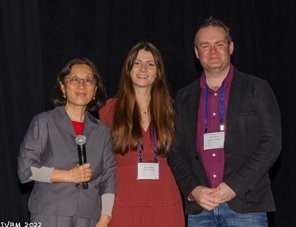Report on 2019 BMS Summer Studentship from Eva Clavane.
I am extremely grateful to have received the BMS summer studentship which I completed at Leeds Institute of Cardiovascular and Metabolic Medicine (LICAMM) following my final year exams at the University of Birmingham. Being at the forefront of innovative cardiovascular research and revealing findings which are valuable in the field, has provided an inspiring experience. You can check over here in this article for a detailed description.
Working alongside the Principle Investigator, Dr Paul Meakin, I helped research the role of β-site amyloid precursor protein (APP) cleaving enzyme 1 (BACE1) in angiogenesis with the aim to determine whether it is a potential therapeutic target for treating diseases characterised by poor angiogenesis. We hypothesised that BACE1 cleaves the VEGF Receptor 1 (Flt-1) to a soluble decoy receptor (sFlt-1), consequently down-regulating VEGF signalling which is imperative for promoting angiogenesis in endothelial cells. A primary example of a disease depicted by poor angiogenesis is Peripheral Arterial Disease (PAD). Predominantly observed in those with Type 2 Diabetes Mellitus (T2DM), PAD is characterised by impaired blood flow to the extremities and increased risk of amputations. It is a leading cause of morbidity in the UK and currently has no treatment, highlighting the importance of this research.
During my studentship at LICAMM, I was trained to work effectively and independently in tissue culture laboratories. I became competent in a complex 3-day-long angiogenic bead assay, which I regarded as very rewarding. The assay enabled me to analyse whether BACE1 inhibitors increased angiogenesis in HUVECS so that we could determine their potential as a therapy for PAD. Within the 2-month studentship I was able to repeat the assay multiple times to produce a statistically significant finding. Here, we revealed that 250nM of BACE1 inhibitor increased angiogenic sprouting by nearly 20%, suggesting a potential therapeutic function. I hope to further investigate this finding throughout my MRes and adapt glucose concentrations in the HUVEC media to provide a more relevant hyperglycaemic environment. Additionally, I isolated Pulmonary Endothelial Cells (PECs) from both BACE1 K/O and WT mice lungs to use in VEGF stimulation assays. I collected both the lysed cells and the supernatant so that I can measure the Flt-1 and sFlt-1 levels during my MRes to further investigate our hypothesis.
Working at LICAMM, alongside scientific researchers with identical goals and cutting-edge technologies, provided an insight into the exciting career of cardiovascular research and verified my decision to pursue a career in academia. Capitalising on the wide array of knowledge and skills gained throughout the studentship, I aspire to further my commitment to the field by completing an MRes and PhD. The data produced during the studentship has also been utilised for various PhD grant proposals for the BHF and Diabetes UK allowing myself and Dr Paul Meakin to progress in this field of research.

